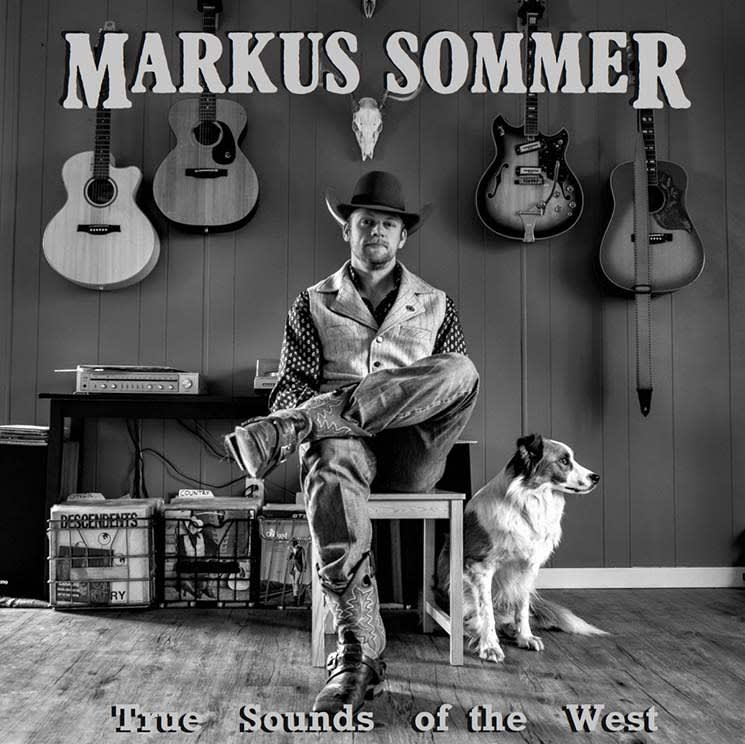Cowboy singing and rodeo are built on certain kinds of mutually reinforcing bullshit, both are a simulacra of labour: a copy of a copy of farm work functioning as a kind of liturgical substitution of a ritual replacement of a colonial act of geographic intervention. Markus Sommer's True Sounds of the West, with stories of him riding broncs or shoeing horses, or a note of how he lives in Southern Alberta, I know the games he's playing.
There are a number of genres that seem more theatrical or more heavily aware of their own irony — cowboy singing is one of those things that is super bullshit and super authentic. For example, on the low and loping "3 Chords and Lies," he makes this argument directly: "All I know is three chords and a lie"; or on the slight, self-aware chug, of "Nothing Really Changes (After All)," he sings, "When I told you were my one and only / You could smell the bull, but I rode broncs."
Nothing is authentic, everything is permitted, and the intimacy between what is being depicted and what is real, and the loneliness of that intimacy, are made even more poignant by the richness and spareness of a hustler's voice. All kinds of intimacy, all kinds of hustling — the anger of fuck-you anthem "Darlene", the noting of landscape on "Low Rolling Plains," or how he elucidates the aesthetic of horse flesh on "The Bay," Sommer's work is an archive of a new western, and evades the marring nostalgia of so much of this work.
He's a brilliant bullshit artist, because he knows telling stories and telling lies are the same matter. He can be so cavalier with the truth because the audience knows that he has cowboy bona fides. The bona fides mark him as a son of the west, and singing cowboys are as much of an act of public performance as they are personal stories. It's ignoring the mythology of the west, and pretending that you know who your daddy is.
Summer's record knows who his daddy is. There is a direct line between "Four Strong Winds" by Ian Tyson, "Short Native Grasses" by Corb Lund and Sommer's "Low Rolling Plains." They are all making geographic arguments, about the idea of a west more than the actual geography — but the arguments can be made, because you trust them to know the geography. Sommer knowing who his daddy is, is knowing how the land runs. It makes you believe the bullshit, which is more than enough.
(Independent)There are a number of genres that seem more theatrical or more heavily aware of their own irony — cowboy singing is one of those things that is super bullshit and super authentic. For example, on the low and loping "3 Chords and Lies," he makes this argument directly: "All I know is three chords and a lie"; or on the slight, self-aware chug, of "Nothing Really Changes (After All)," he sings, "When I told you were my one and only / You could smell the bull, but I rode broncs."
Nothing is authentic, everything is permitted, and the intimacy between what is being depicted and what is real, and the loneliness of that intimacy, are made even more poignant by the richness and spareness of a hustler's voice. All kinds of intimacy, all kinds of hustling — the anger of fuck-you anthem "Darlene", the noting of landscape on "Low Rolling Plains," or how he elucidates the aesthetic of horse flesh on "The Bay," Sommer's work is an archive of a new western, and evades the marring nostalgia of so much of this work.
He's a brilliant bullshit artist, because he knows telling stories and telling lies are the same matter. He can be so cavalier with the truth because the audience knows that he has cowboy bona fides. The bona fides mark him as a son of the west, and singing cowboys are as much of an act of public performance as they are personal stories. It's ignoring the mythology of the west, and pretending that you know who your daddy is.
Summer's record knows who his daddy is. There is a direct line between "Four Strong Winds" by Ian Tyson, "Short Native Grasses" by Corb Lund and Sommer's "Low Rolling Plains." They are all making geographic arguments, about the idea of a west more than the actual geography — but the arguments can be made, because you trust them to know the geography. Sommer knowing who his daddy is, is knowing how the land runs. It makes you believe the bullshit, which is more than enough.
